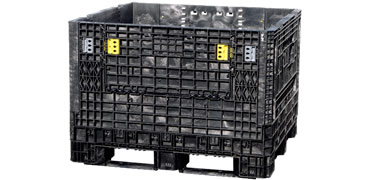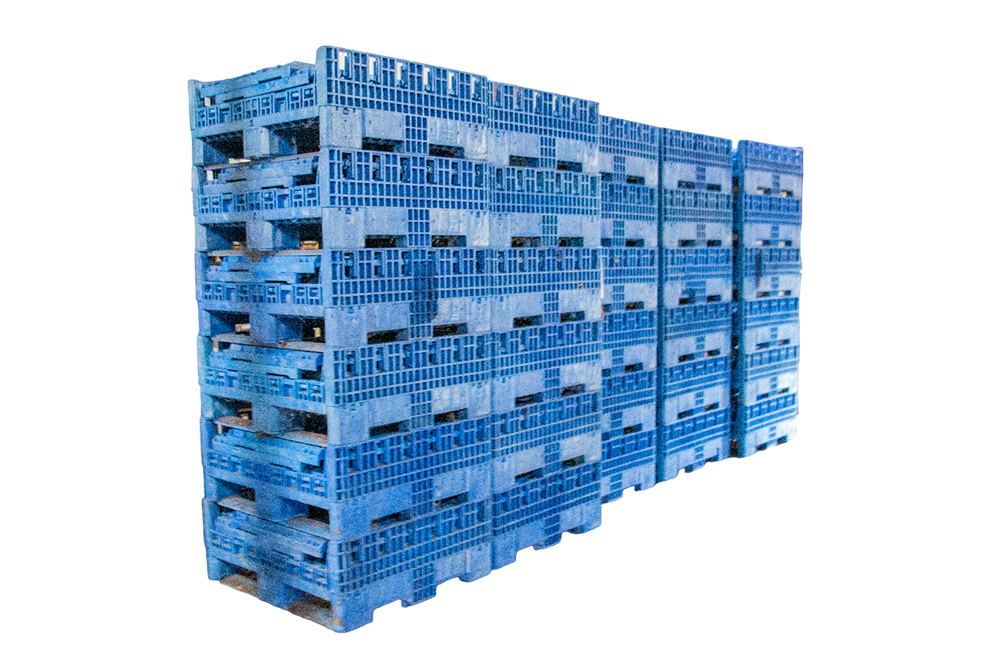The Ultimate Overview to Choosing the Right Bulk Containers for Your Organization Requirements
Selecting the suitable mass containers is crucial for any kind of company that counts on efficient logistics. Different sorts of containers exist, each designed for certain materials and applications. Elements such as dimension, material compatibility, and governing criteria play a considerable duty in this decision-making procedure. Understanding these components can bring about improved functional efficiency. Several services overlook crucial elements that can enhance their general efficiency and sustainability. What are these factors to consider?
Comprehending Different Types of Mass Containers
Mass containers work as vital tools for companies looking for reliable storage space and transport services. These containers come in different kinds, each created to meet details functional requirements. One usual kind is the intermediate mass container (IBC), which is optimal for fluid and granulated materials, supplying a balance of capacity and maneuverability. One more prominent alternative is the bulk bag, or FIBC, suitable for dry, flowable products. These flexible containers are light-weight and can be quickly transferred and kept. For heavier materials, stiff bulk containers are often utilized, giving resilience and security for secure handling. Additionally, there are specialized containers customized for hazardous products, ensuring conformity with safety regulations. Understanding the distinct characteristics of these mass container kinds enables businesses to make informed decisions that enhance logistics and minimize prices. By selecting the right container, business can boost their functional effectiveness and improve their supply chain processes.
Secret Material Factors To Consider for Mass Containers
When picking mass containers, it is important to ponder the products used in their building and construction. Elements such as strength, chemical, and toughness compatibility play a crucial role in ensuring the containers satisfy certain operational demands. Furthermore, weight and mobility issues can affect both performance and transport logistics.
Material Resilience and Strength
Sturdiness and strength are essential consider selecting materials for mass containers, as they straight influence the container's capability to withstand different ecological problems and handling processes. Materials such as high-density polyethylene (HDPE), polypropylene, and stainless-steel are frequently preferred for their robust residential properties, providing resistance to temperature level, impact, and abrasion changes. The choice of material also affects the general life-span of the container; stronger materials typically lead to much less regular replacements, causing set you back financial savings over time. In addition, the weight of the product can impact shipping expenses and simplicity of handling. Organizations have to consider their certain operational environments and the possibility for deterioration to guarantee peak durability and strength in their bulk container choice.
Chemical Compatibility Elements
Comprehending chemical compatibility is essential for picking bulk containers, as the products used have to withstand the particular materials they will hold. Various factors influence compatibility, consisting of the chemical nature of the components, temperature, and duration of storage. For circumstances, harsh chemicals might require containers made from stainless-steel or specialized plastics that resist degradation. In addition, responsive materials can generate warm or gases, demanding vented or pressure-rated containers. The selection of container material, whether steel, polyethylene, or polycarbonate, must line up with the chemical homes of the saved materials to stop leakages or violations. Inevitably, a comprehensive analysis of these compatibility variables ensures safe handling and storage space, shielding both workers and the environment while keeping product honesty.
Weight and Mobility Concerns
Choosing mass containers includes not only reviewing chemical compatibility yet likewise considering weight and portability. Organizations need to assess the ease of handling and transportation to enhance effectiveness. Light-weight materials like high-density polyethylene (HDPE) or light weight aluminum can assist in less complicated activity and minimize delivery expenses. Conversely, larger containers may supply enhanced longevity yet can prevent movement, specifically in environments needing constant moving. Additionally, the style of the container should permit convenient training and stacking, making sure ergonomic safety and security for workers. Firms should also consider the framework readily available for transport; for instance, containers compatible with forklifts or pallet jacks can streamline operations. Eventually, the ideal equilibrium between weight and mobility directly influences operational performance and price efficiency.
Sizing Your Bulk Containers for Optimal Efficiency
When sizing bulk containers, organizations need to very carefully assess the measurements required to fit their particular items. Furthermore, weight ability is a vital factor that affects effectiveness and security during transport and storage. Reliable sizing not only makes best use of space yet also optimizes operational process.
Identifying Container Capacities
Choosing the right measurements for mass containers is vital for making the most of efficiency in storage space and transportation. Services need to examine their specific demands, considering aspects such as readily available area, the nature of the goods being saved, and the methods of transportation utilized. Accurate measurements guarantee that containers fit preferably in storage facilities and cars, minimizing wasted room and reducing dealing with time. Standard dimensions can use benefit, yet custom measurements could be required for special requirements or to fit details products. Additionally, it is very important to assess piling capabilities and access, as these elements affect total operational performance. Eventually, the appropriate dimensions lead to boosted organization and streamlined logistics, benefiting the general performance of the company.
Weight Capacity Considerations
Comprehending weight ability is crucial for services intending to maximize their mass container efficiency. The weight capability of a container directly influences storage space abilities, transportation logistics, and total functional prices. Choosing containers with the ideal weight restrictions assures that organizations can safely keep and deliver their items without risking damage or conformity concerns. Overloading containers can result in architectural failings, while underutilizing ability cause squandered resources. When selecting containers, it is essential for organizations to analyze their product weights and take into consideration any type of regulatory requirements. In addition, variables such as the sort of product, meant use, and environmental problems need to likewise influence weight capability choices. By evaluating these elements, businesses can improve effectiveness and ensure a streamlined supply chain.
Regulative Conformity and Safety Requirements

Regulative conformity and safety requirements play a necessary role in the find out selection of mass containers for businesses. Organizations has to ensure that their containers meet numerous guidelines established by regional, nationwide, and worldwide authorities. These criteria commonly refer to material security, architectural honesty, and proper labeling, which assist prevent accidents and assure the risk-free transportation of items.
Furthermore, adherence to industry-specific guidelines, such as those from the Fda (FDA) or the Occupational Security and Health Management (OSHA), is vital for companies managing unsafe products or food. Non-compliance can cause fines, lawful concerns, or damages to a business's credibility.
Companies need to likewise think about the container's compatibility with the products being stored or carried to avoid contamination or chain reaction (used collapsible containers). To sum up, recognizing and applying regulative compliance and safety criteria is crucial for the reliable and liable use bulk containers
Sustainability Alternatives for Eco-Friendly Mass Containers

Business are likewise discovering alternatives made from recycled products, which not only save sources however additionally sustain the recycling market. Advancements in layout permit for lighter containers that call for less energy to transport, further boosting sustainability. By incorporating these green mass container options, businesses can demonstrate their dedication to ecological stewardship while fulfilling customer need for sustainable practices. This change not just assists the planet however can also boost brand name reputation and client commitment.
Cost-Effectiveness and Budgeting for Bulk Containers
While lots official statement of businesses concentrate on sustainability, cost-effectiveness continues to be a crucial element when picking bulk containers. Organizations must examine the preliminary purchase cost, along with long-term functional expenses, to assure financial viability. Variables such as durability, reusability, and upkeep play a significant function in identifying total expenditures.
Investing in top notch containers might generate greater in advance costs but can result in savings via reduced replacement rates and reduced waste. Additionally, businesses should consider transport expenses and storage efficiency, as these can affect the general budget plan.

Frequently Asked Questions
Exactly how Do I Establish the Right Container for Hazardous Products?
To identify the ideal container for hazardous materials, one need to review compatibility with the compound, think about the container's material, check for regulatory conformity, and assess capability and security functions to ensure appropriate handling and storage space.
Can Bulk Containers Be Custom-made for Particular Products?
Yes, bulk containers can be customized for particular items. used plastic containers. Various attributes, such as layout, size, and product, can be customized to satisfy special requirements, ensuring suitable security and efficiency for carrying and keeping different products
What Is the Typical Lifespan of Various Bulk Container Types?
The average lifespan of bulk container types varies; plastic containers last 5-10 years, steel containers 10-20 years, and wood containers commonly last 3-7 years, depending upon usage, upkeep, and ecological problems.
Exactly how Should I Clean and Maintain Bulk Containers?
To clean and maintain bulk containers, one need to routinely inspect for damages, get rid of deposit, laundry with ideal cleaning agents, wash extensively, and guarantee correct drying out before storage. Adhering to producer standards improves long life and safety during use.
Exist Rental Options for Mass Containers Available?
Yes, many companies offer rental options for mass containers, giving adaptability for businesses. These services can suit various demands, permitting firms to manage inventory efficiently without the dedication of buying containers outright.
Longevity and stamina are essential aspects in choosing materials for bulk containers, as they directly affect the container's capability to endure various ecological conditions and dealing with processes. Recognizing chemical compatibility is important for selecting mass containers, as the materials utilized must resist the details compounds they will certainly hold. Comprehending weight capacity is vital for organizations aiming to optimize their mass container efficiency. Governing conformity and safety standards play an click site essential duty in the selection of mass containers for organizations. While several services concentrate on sustainability, cost-effectiveness continues to be a critical variable when choosing mass containers.